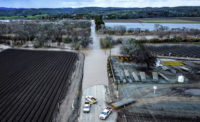More than two weeks after an explosion leveled the Beirut port and other areas of the Lebanese capital, recovery efforts for damage to structures and infrastructure, estimated at $10 billion to $15 billion, are still in disarray, say representatives of local construction sector companies.
“Currently the cleanup efforts are not being coordinated,” Bassam El Asmar, business group development manager for Beirut-based contractor C.A.T. Group, told ENR. “It is basically just [non-governmental organizations] and private initiatives involved in reclamation efforts. Nothing is sure at this stage. The situation is beyond what the government can handle.”
The Aug. 4 explosion was of a a 2,750-ton stash of ammonium nitrate stored in the city's port area that had been forgotten and ignored for six years. About 8,000 buildings were damaged, and an estimated 200 people are believed to have been killed. As many as 6,000 people were injured, and an estimated 300,000 are homeless or without adequate shelter, electricity and water.
The explosion destroyed port infrastructure, including a grain silo, the destruction of which leaves Lebanon facing widespread hunger in coming weeks and months and dependent on international humanitarian aid.
Buildings have yet to be assessed for their condition and whether they need to be demolished, says Asmar, adding that it appeared that most buildings within a 3-kilometer radius of the port had been wrecked, including his company’s headquarters, 200 meters away. “Our offices were devastated, everything damaged,” he said
Of the estimated 8,000 damaged buildings, about 640 are of historic importance and 60 are on the verge of collapse, Sarkis Khoury, director-general of antiquities at the Ministry of Culture in Lebanon, told UNESCO.
At least three hospitals were destroyed or heavily damaged, including St. George’s Hospital, which is completely “out of order,” Asmar said. Some effort is being made to salvage medical equipment and supplies, but otherwise the building is unusable.
Lebanese civil defense, police and army personnel, as well as teams from France, Turkey, Netherlands, Poland, Spain and the U.S. are clearing rubble, likely to increase the death toll, and further investigating the explosion, said Abboud Zahr, manager of a Beirut-based oil services company.
Public outrage over the blast forced Prime Minister Hassan Diab and his cabinet to resign Aug. 10, leaving President Michel Aoun in power, but with little political authority to contract companies to carry out cleanup and restoration and most now work now being carried out by volunteers, Asmar said.
“There is no company yet involved in clearing activities in Beirut port,” Zahr told ENR by email.
Calls to Lebanon’s Ministry of Information and Ministry of Public Works and Transport went unanswered, as did those to the Red Cross office in Beirut.
Over the years, Lebanon has become more dependent on diesel generators to produce their own electricity, as state-owned Electricite du Liban has been unable to refurbish existing power plants or build new ones. Three power-generation ships supplied by Turkey-based company Karadeniz Energy Group—two of which have been in Lebanon for several years and escaped the blast—are supplying Beirut with up tof 600 MW of electricity.
Lebanon’s northern port of Tripoli has been pressed into service as an alternative to Beirut. According to Asmar, there is a trickle of humanitarian aid coming into the Beirut port. “It appears that the cranes north of the port were not badly damaged, so they might be used to offload containers,” he said, adding that he saw large trucks hauling UN-marked containers out of the port this week. “But what happens with the port is a big question,” Asmar said.
Asmar also pointed out that Beirut residents who want to repair their properties are hamstrung by the country’s financial crisis.
People must withdraw money from banks at the official government rate, which is six to seven times lower than what the money is worth on the local black market. That currency is then used to buy U.S. dollars–making repairs exorbitantly expensive and a possible step to bankruptcy. “
This is another factor that will hinder reconstruction,” Asmar said.





Post a comment to this article
Report Abusive Comment